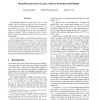Free Online Productivity Tools
i2Speak
i2Symbol
i2OCR
iTex2Img
iWeb2Print
iWeb2Shot
i2Type
iPdf2Split
iPdf2Merge
i2Bopomofo
i2Arabic
i2Style
i2Image
i2PDF
iLatex2Rtf
Sci2ools
100
click to vote
FOCS
2003
IEEE
2003
IEEE
Bounded Geometries, Fractals, and Low-Distortion Embeddings
The doubling constant of a metric space (X, d) is the smallest value λ such that every ball in X can be covered by λ balls of half the radius. The doubling dimension of X is then defined as dim(X) = log2 λ. A metric (or sequence of metrics) is called doubling precisely when its doubling dimension is bounded. This is a robust class of metric spaces which contains many families of metrics that occur in applied settings. We give tight bounds for embedding doubling metrics into (low-dimensional) normed spaces. We consider both general doubling metrics, as well as more restricted families such as those arising from trees, from graphs excluding a fixed minor, and from snowflaked metrics. Our techniques include decomposition theorems for doubling metrics, and an analysis of a fractal in the plane due to Laakso [20]. Finally, we discuss some applications and point out a central open question regarding dimensionality reduction in L2.
Doubling Metrics | FOCS 2003 | General Doubling Metrics | Metric Spaces | Theoretical Computer Science |
| Added | 04 Jul 2010 |
| Updated | 04 Jul 2010 |
| Type | Conference |
| Year | 2003 |
| Where | FOCS |
| Authors | Anupam Gupta, Robert Krauthgamer, James R. Lee |
Comments (0)

